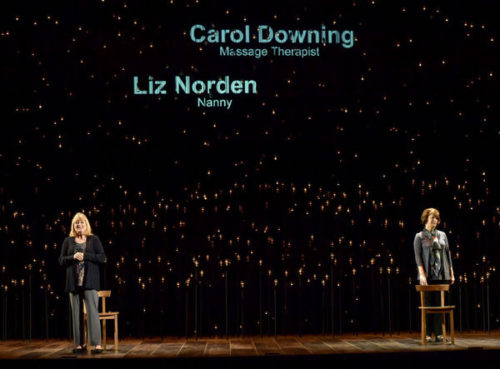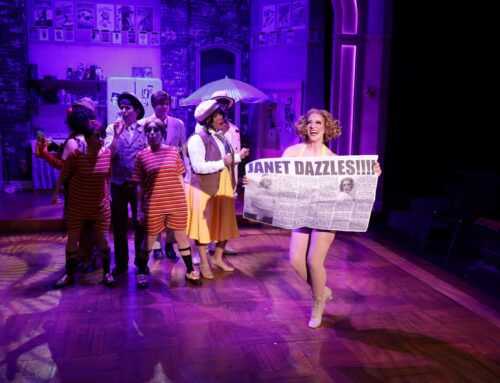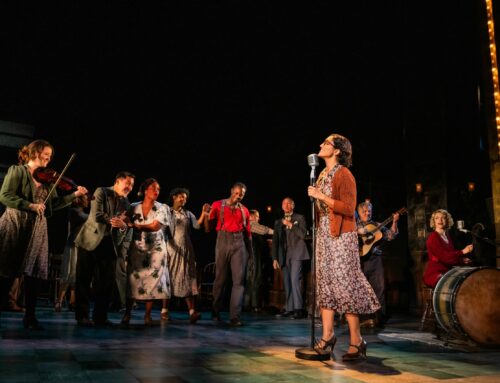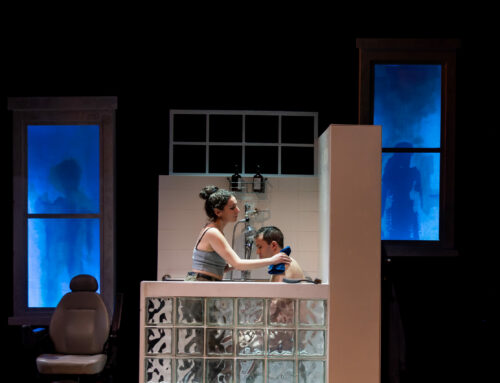I just saw the world premiere of FINISH LINE: A Documentary Play About the 2013 Boston Marathon. It runs circles around the movie “Patriot’s Day” which managed to somehow reduce this global tragedy even as it ramped up the explosions and Mark Wahlberg’s ubiquitous heroics. FINISH LINE has no literal explosions and makes a better point: there were no heroes, that is, no ONE person– but rather everyONE working together as ONE to save 270 lives in crisis. Here’s a behind the scenes look at the making of this documentary play broadcast on NBC Boston.
I should also make clear that I know the co-creators of this play very well Lisa Rafferty and Joey Frangieh who also directed; I have worked with them, love them, and perhaps should recuse myself from reviewing. But I want my say, and trust my own instincts, regardless of friendship, about what I see and feel as I sit in the dark watching. FINISH LINE is a moving document that swelled my heart which I thought had grown impervious to any more news of that terrifying day in April when the world’s most iconic and beloved marathon was blown up, taking with it several lives and rupturing many more. While the play still has a way to go before it fully resonates, this version is on the right track.
It’s a tale of two experiences; in the midst of the blood and fear, the event not only highlighted the worst, but also the best in us. A cast of 12 featuring 10 local actors spoke the actual words of the survivors: runners, families, police officers, medical personnel, journalists, clergy. We may not be entirely familiar with some of these stories, and that helped flesh out the breadth of the impact and universality of what happened.
The set and staging are appropriately simple and effective. The actors walk out one by one on a darkened stage illuminated by a sea of single bulbs; like warmly lit stalactites and stalagmites, some stem from the ground up, like flames keeping vigil, while others hang from the sky like stars. As the actors emerge, they are identified by their characters’ names on a screen suspended above center stage. This is the ONLY video projection and rightly so; the heart and soul of what transpires over the next 90 uninterrupted minutes is what makes theater, what we cannot see, but can fully imagine: the story and the words used to tell it. What is immediately stunning is the simple poetry of natural, everyday speech, intimate and unadorned, and the power of the real.
That leaves the actors the not so simple task of being transparent, not getting in the way of what is already there, but bringing it naturally alive. This cast is among Boston’s best and they did us proud. Karen MacDonald in a dual role, plays Liz Norden a mother who takes us through her horrifying day only to discover that both her sons had each lost a leg. Her earthy, blunt ownership of all her feelings of fear, angst, anger, gratitude– let us in. When she unabashedly proclaims she will never have closure, I somehow felt relieved of the burden of having to get over something before being ready– or ever.
At the fulcrum of the play she is joined on stage by Paula Plum, breathtaking as Carol Downing a massage therapist from out of town, searching for her daughter Erika a pre-school teacher (the brightly charismatic Amie Lytle). As Carol makes her way through Boston searching for her daughter, local strangers appear miraculously, feeding her and helping her finally locate her daughter in an ICU, severely damaged and almost unrecognizable–but alive. Other standouts: Lewis D. Wheeler who brought a luminous humility and gravitas to his role as Dr. David R. King a surgeon in awe of the resilience of those he treated. Sam Tanabe as young Brad Jensen, was so funny and relatable as a newbie to the marathon and later as he talked about the survivor guilt felt by his family as they urged him away the scene, as others ran toward it to help.
A few stories needed editing or didn’t fully engage: Greg Maraio’s EMT needed shortening and shaping. Plum’s other role as TV anchorwoman Maria Stephanos wasn’t convincing, and her story which turned the lens away from the tragedy and toward the telling of it– was off-putting. There’s a better way to tell that. Danny Bolton as a Boston Globe photojournalist didn’t capture me. I also wondered about other stories, what of the experiences of those who were with the victims who died?
FINISH LINE remains a work in progress, but is essential now because it re-opens a wound with an eye toward healing and more than that, the power of compassion. For those who experienced the horror of blind hatred on a sunny day in Boston, there may be no more profound awareness than that embodied by this “chorus”at the “finish line” in an original song tenderly sung by Rachel Belleman called RISE. We are better together than apart as we head toward the FINISH LINE. Presented by the Boch Center with Boston Theater Company at the SHUBERT THEATRE through March 26.
***For all Finish Line performances scheduled from Friday, March 17 – Sunday, March 26, 2017, a select number of tickets will be reserved for day of, in person box office purchases where members of the community will be able to simply “pay what your heart feels.” $3.00 of every ticket sold will be donated to support the Martin Richard Foundation and Martin’s Park.







Leave A Comment
You must be logged in to post a comment.